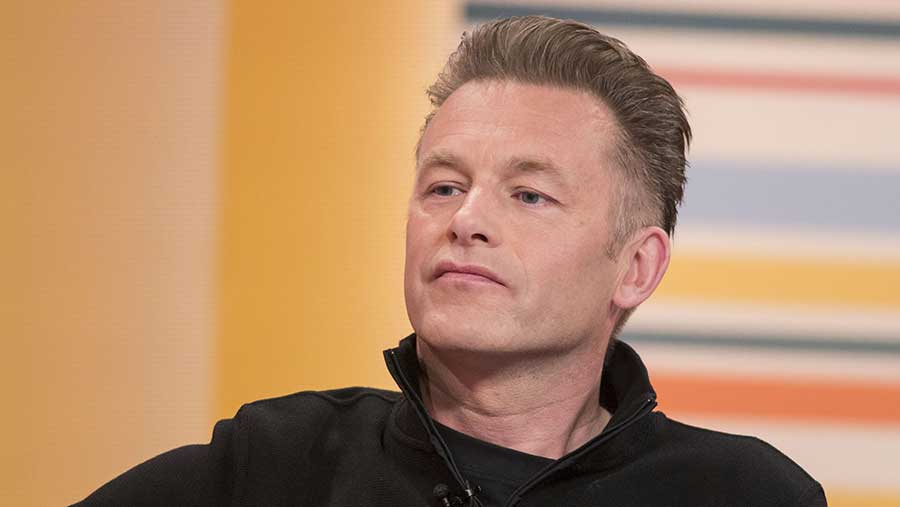BBC’s Chris Packham sparks glyphosate safety row
 © Steve Meddle/ITV/REX/Shutterstock
© Steve Meddle/ITV/REX/Shutterstock BBC presenter Chris Packham has risked the ire of the farming industry again – this time by urging people to sign a petition to ban glyphosate.
The Springwatch and former The Really Wild Show presenter posted a link to the online “Stop Glyphosate” petition on his Twitter account.
He told his 178,000 followers: “We could get toxic glyphosate banned but only if we act together. Sign now.”
See also: Study sparks fresh row over glyphosate safety
On Sunday (12 February), Mr Packham tweeted a link to a study exploring “the potential dangers of glyphosate”.
Mr Packham’s tweets sparked a mixed reaction on Twitter. But farmers roundly criticised his actions.
Frustrated former NFU president Peter Kendall showed his disapproval via his Twitter account (@pkendallfarm). He wrote: “And he’s still being employed by the BBC.”
Other farmers went further.
Yorkshire farmer and Club Hectare co-founder Jono Dixon, who farms at Sunk Island, east of Hull, hit out at Mr Packham.
He wrote on his Twitter account (@sunkfarmer): “The birth control pill is more dangerous than #glyphosate as is toothpaste. Packham you buffoon do ya homework.”
Glyphosate ‘is vital’
UK farmers then hit back at Mr Packham on Twitter by tweeting dozens of message in support of keeping glyphosate along with the hashtags #glyphosateisvital and #BackBritishfarming
North Yorkshire grower Andrew Wilson (@SpudSlingsby) accused Mr Packham of “pouring out cobblers” and he asked the TV host “does he want folk to starve?”
Merseyside grower Olly Harrison (@agricontract) tweeted: “#glyphosate can help protect soil from the damage of cultivations and ploughs.”
Meanwhile, pro-GM campaigner Mark Lynas (@mark_lynas) also weighed in on the argument.
He wrote: “Why not campaign to ban bacon? It’s in the same [International Agency for Research on Cancer] category as glyphosate and people actually eat it. #posttruth”.
u need basic lessons in understanding toxicity. Glyphosate is less toxic than caffeine, aspirin & table salt #risknothazard
— Longwool (@Longwool) February 9, 2017
Regulatory bodies around the world have concluded #glyphosate is safe. https://t.co/EgEH7G93wj pic.twitter.com/OeL3TGjNec
— National Farmers' Union (@NFUtweets) February 13, 2017
Please RT #glyphosate @TheFarmingForum @NFUNorthWest @CropsBoard @FarmersGuardian @mattredmanag @FarmersGuardian pic.twitter.com/SntaA3DIDp
— Olly harrison ???AccidentalYoutuber (@agricontract) June 1, 2016
Last month, Mr Packham angered farmers by posting a tweet claiming farmers were shooting lapwings, which was resulting in the decline of the iconic farmland bird.
He later apologised “for this mistake”.
Safety review
Glyphosate, the key ingredient in Monsanto’s herbicide and top-selling weedkiller Roundup.
It is is a vital tool for weed control which allows farmers to use conservation tillage techniques such as minimum or zero-tillage.
The European Chemicals Agency (ECHA) is reviewing the safety of glyphosate amid conflicting reports it may cause cancer.
Monsanto maintains glyphosate, when used according to label directions, “does not present an unreasonable risk of adverse effects to humans, wildlife or the environment”.
In July, the European Commission extended glyphosate’s license for 18 months, while advising members states to restrict its use on pre-harvest crops and in public places.
Glyphosate’s licence will be up for review at the end of 2017 and the ECHA has been tasked with deciding if it should be classed as a carcinogen.
Watch the ECHA video explaining its role in the EU-wide classification of glyphosate.
